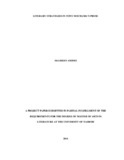| dc.description.abstract | This study set out to examine the literary strategies in Mochama’s prose and the resultant
social, economic and political concerns revealed. The study explores the strategies of
language, plot, setting, narration and characterization that Mochama employs to enhance
the communicative aspect in his works. I argue that the various literary strategies
Mochama employs allow him to concretize his views about the contemporary Kenyan
society. Literary language in essence is defamiliarized hence allowing the reader to rethink
and re-see the ideas the writer talks about in new light. Literary language is
foregrounded and therefore draws attention to itself hence it is emphasized. This project
paper utilized two theories: Russian Formalism and Achille Mbembe and Bill Ashcroft’s
strands of Postcolonial theory. The study entailed a close textual analysis of Mochama’s
prose works: The Road to Eldoret and Other Stories, Princess Adhis and the Naija Coca
Broda, Meet the Omtitas and Nairobi: a Night Guide through the City-in-the-Sun as well
as relevant secondary texts which allowed me to concretize the arguments about literary
strategies. This study demonstrates that Mochama is able to communicate to the readers
through the use of literary language. He manipulates language resources through both
transgressions against and conformity to conventions to draw attention of the reader to
the dystopia prevalent in the contemporary Kenyan society. At the same time he leaves
room for hope in the degenerated society. | en_US |

